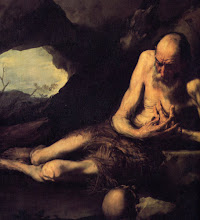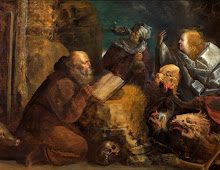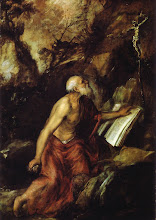
Letter of Dom Guigo the Carthusian to Brother Gervase about the Contemplative Life
To Brother Gervase from his dear friend, Brother Guy:
Greeting and joy in the Lord! I am bound to love you for the love which you first showed to me, and I owe you a letter in return for yours. I send you, therefore, these thoughts of mine concerning the spiritual way which monks should follow. I send them that you may judge and correct my work, for you know much more about the matter than I do, since you know it by experience and I only by study. I owe you some return for all you have done for me. You stole me, O happy theft, from the slavery of Egypt and the delights of the wilderness, to make me a soldier in the ordered army of God. I was a shoot of wild olive , and you cut me off skilfully and wisely grafted me on to the fruitful tree. The first-fruits of my toil are yours by right, and to you I now offer them.
A Ladder of Four Rungs By Which We May Well Climb to Heaven
The First Chapter:
Of the Four Rungs in General
When I was at hard at work one day, thinking on the spiritual work needful for God's servants, four such spiritual works came to my mind, these being: reading; meditation; prayer; contemplation. This is the ladder for those in cloisters, and for others in the world who are God's Lovers, by means of which they can climb from earth to heaven. It is a marvellously tall ladder, but with just four rungs, the one end standing on the ground, the other thrilling into the clouds and showing the climber * heavenly secrets.
This is the ladder Jacob saw, in Genesis, that stood on the earth and reached into heaven, on which he saw heavenly angels ascending and descending, with God leaning upon the ladder. From the ascending and descending of the angels is understood that the heavenly angels delight us with much spiritual comforting and carry our prayers up to our Lord in heaven, where he sits on high, and bring back down from him the desire of our hearts, as is proved by Daniel. By God's supporting the ladder is understood that he is always ready to help all who by these four rungs of this ladder will climb wisely, not fearing nor doubting that such a ladder will really help us.
Understand now what the four staves of this ladder are, each in turn. Reading, Lesson, is busily looking on Holy Scripture with all one's will and wit. Meditation is a studious insearching with the mind to know what was before concealed through desiring proper skill. Prayer is a devout desiring of the heart to get what is good and avoid what is evil. Contemplation is the lifting up of the heart to God tasting somewhat of the heavenly sweetness and savour. Reading seeks, meditation finds, prayer asks, contemplation feels. Vnde querite et accipietis: pulsate et aperietur vobis. That is to say 'Seek and you shall find: knock and the door will be opened for you'. That means also, seek through reading, and you will find holy meditation in your thinking; and knock through praying, and the doors shall be opened to you to enter through heavenly contemplation to feel what you desire. Reading puts as it were whole food into your mouth; meditation chews it and breaks it down; prayer finds its savour; contemplation is the sweetness that so delights and strengthens. Reading is like the bark, the shell; meditation like the pith, the nut; prayer is in the desiring asking; and contemplation is in the delight of the great sweetness. Reading is the first ground that that precedes and leads one into meditation; meditation seeks busily, and also with deep thought digs and delves deeply to find that treasure; and because it cannot be attained by itself alone, then he sends us into prayer that is mighty and strong. And so prayer rises to God, and there one finds the treasure one so fervently desires, that is the sweetness and delight of contemplation. And then contemplation comes and yields the harvest of the labour of the other three through a sweet heavenly dew, that the soul drinks in delight and joy.
The first degree is for beginners, the second for those profitting from it, the third for those who are devout, the fourth for those who are holy and blessed of God. The four degrees are so bound together, and each of them so ministering together to each other, that the first as reading and meditation helps only a little or nought all, without those that follow it, such as prayer and contemplation. Also without the first two we delay winning the last two. What use to spend your time in reading or listening to the deeds of the Holy Fathers, unless we bite and chew on them through meditation, and draw out somewhat and swallow it and send it to the heart, so that we may find, and by this understand, our own defaults, and after such knowing that we set ourselves to work that we may attain those virtues that were in them? But how may we thus think or take care that no false or unclean thought pass the boundaries set by our Holy Fathers but if we first either through hearing or in reading be so lawfully taught. Also what does it help a man if he see through meditation what he ought to do unless he through the help of prayer and of God's grace do what he can to win and to hold what he has found in meditation, and understand what he must do for his soul's health? For as the Apostle James says: 'All good gifts and all perfection comes from above from the Father of Light', without whose help we are unable to do any good.
But the good that is in us, if there be any, he does it in us, but not without us, for as Paul says: 'Cooperatores Dei sumus'. That is, we are God's helpers for our good; that is, we open our hearts when he sends us goodness through his grace, and do what is in us to keep and to hold it. But because we may do nothing in repayment, nor for our soul's health, except through his grace, it is therefore somewhat needful to speak of God's grace in this little book.
You shall understand there are three graces from God.
The first is a common grace given by God to all creatures. And this is God's help that he through his goodness gives to all creatures after their kind that they may move and feel, and without his grace they may do nothing, nor in the kind last or endure. For as you just as does water, when it is hot through the force of fire, when fire is removed from it, it ceases to stay warm and naturally it cold; just so is it with each creature and St Augustine notes. For as all creatures are and are made of nought, unless they are sustained and preserved by his grace, soon they will become nought again. St Paul understood that well when he said, 'Gracia Dei sum id quod sum'; as if he said, 'That I am, that I am alive, that I see, feel, or go, or stand, all is from God's grace'.
There is another grace from God, and this is more special. And this grace God only gives to us, to take if we will. And this grace stands always at the door of our heart, and knocks upon our free will to ask to enter, as it says in the Book of Secrets: 'Lo, I stand at the door and knock. Whoever hears my voice and opens the door to me, I shall enter to him, and I shall dine with him and he with me'. Behold here, the gentleness of our Lord who offers himself so humbly of his merciful grace. And this grace is called the grace of God's free gift to us. We need to receive this grace when God sends it, and dispose ourselves with the help of this second grace that we may be worthy to receive the gift of the Holy Spirit, that moves us to good and recalls us from evil.
You will understand that for the health of our souls two things are necessary: the first is grace, of which we shall now speak, and the other is free will. Without these two no human creature may achieve soul health for ought that is in us. For free will cannot help without grace, nor grace without free will's help and consent. This St Augustine notes where he says: 'Qui creauit te sine te non iustificabit te sine te'. That is to say, 'He who made you without you', that is, without your help, 'cannot justify you without your help'. And though our free will cannot make grace in us, nevertheless we may do what is in us - cast out the old, which is the old corruptible sin that draws us from grace, and so make us ready that we may receive this grace. As you see that you may not through your own strength make the house be light, yet you may open the window and let the sun shine in to show its light; and if you close your eyes against the sun, who is to blame if you see nought? And if you will not open your mouth to take food, you complain wrongly if you are hungry. God says to you, 'Take heed, if you will open your mouth I will fill it' That means, 'Open your heart to me, and I will fill it with my grace'. And therefore we are greatly to blame who lack this grace, for St Augutine said, 'We lack not grace because God has not given it'. that means, we do not what is in us to receive it, for if we did, the grace of God would come to us to dwell in us. Therefore St Augustine says, 'Deus ingenti liberalitate replet omnes creaturas pro captu earum'. That is to say, God through his great freedom, so free and so generous that he fills all creatures according as they are able to receive. Therefore if we who are moved and called to this grace will open open the gates of our heart and with our free will grant it entry freely he will dwell wholy with us and make us to be in work his true companion. And therefore the apostle says, 'Gracia Dei in me vacua non fuit'. That is, 'The grace of God was not void in me'. No more it was, for he showed in his outer works that the grace of God wrought in him. He does so utterly with all those with whom he makes his dwelling, for he may not be idle, for he must doo ther work for which the Father of Heaven sent him. Of this grace St Augustine spoke and said, 'This grace is ever ready to me, if it finds me ready. Where ever I go, he never leaves me, unless I leave him first'.
God is as a partner in half getting God's works, and works with us as a partner who will profit. He gives his grace, and we our works, as merchants who will profit from what they have coming to them. And he marvellously challenges the love and respect that he has of us, but we as false wretches cheat him fraudulently. And we think we gain all, and we lose all, for we do injury and fraud, we give our love to the devil and our respect to the world and the flesh, and so our love is withdrawn from our gracious partner. As John says in his Epistle, 'Nolite diligere mundum neque ea que in mundo sunt'. That is to say, 'Do not love the things of this world'. Whoever loves the world, the charity of the Father is not in him, for all that is in the world is covetousness of flesh and covetousness of eye and pride of life, which is not of the Father but of the world. And the world shall pass, and covetousness of it. These things are beloved contrary to the counsels of our Lord God and partner. And we defraud him of his part that he bought at such great price, that is with the blood of the undefiled Lamb, Christ Jesus. We separate ourselves from the bliss of our Lord wilfully, just like the hound that carried a cheese to the water bank, and as he looked in the water he saw a shadow of the cheese and he opened his mouth to take it and it fell from him. And God says to such people through Isaiah the Prophet, ' Gloriam meam alteri non dabo'. That is, 'My loving and my worship I shall give to none other but to them, that is to say, who are my true servants'. Be then, man, to God as a true partner and let him have his share.
The third grace is more special, for this is not given to all men, but only to those who open the gates of their heart, and their free will ready to receive this grace that is described here. This grace is the gift of the Holy Spirit that moves us to do good deeds. This grace God gives to us that through it we may gain merit. Without this grace nothing is worthy that we do. This graces rises out of three, the first grace that is freely given that moves the will freely, the other is the assenting of that will, and the third is God making and giving this grace. This grace is the token of God's special love to those whom he sends it. This grace makes us patient in all angryness and meekly endure the loss of goods, loss of worldly friends, bodily harms, sicknesses and penance to remove sin without grudging. This makes us continue in goodness, this makes us wary of evil and to know all good. This God gives her to us as an earnest of the endless bliss if we will hold to it. Therefore by this grace the angels speaks in the Book of Secrets thus, 'Tene quod habes'. 'That is, 'Hold what you have'. As if he said, 'If you will have that joy that is endless, hold fast to that grace that God has sent to you, for this grace leads to bliss.
The Second Chapter:
How the Four Rungs are Closely Joined Together
But God wills that we pray for this blessed grace, and he wills that we open the door of our heart to his coming, and that is that we assent with our free will to receive his grace. This consent Christ Jesus asked of the Samaritan woman to whom he spoke at the well, as she stood there to draw water, to whom he said: 'Go, and call your husband', as if he had said, 'I will give you my grace if you will assent with your own will.' Also, he asked prayer of her when he said, 'If you knew God's gift, and who he is who says to you "Give me drink", perhaps you would ask of him and he would give to you living water'.
When the woman heard Jesus' words, she thought in her heart that it was good and needful to drink of this precious living water of which Christ spoke. And immediately with great desire she prayed to have this water and said, 'Lord, give me this water'. See now how hearing of Christ's word and following that meditation with deep thought in her heart moved her to pray for this water. How should she have been so moved to pray unless the meditation of her heart had stirred her to this? Or what should the former thought of meditation have brought to her, unless the prayer that followed had won of Christ what she desired? If you will have your meditation richly rewarded you must pray with devotion, through which you may win to the sweetness of contemplation.
Through this then you may understand that reading without meditation is idle, meditation without prayer is without effect, but prayer with devotion wins contemplation. To win to the high ladder of contemplation without prayer, would be miraculous. The power of Almighty God is endless, and his mercy above all his works. Another time he raises of the hard stones Abraham's sons, when he moves and stirs those who are as hard as stones in wickedness to love God. And so as they say, 'He gives the ox by the horn'. That is when he called offers his grace and, neither sought nor desired, joins himself to them. If we read that this can happen so to any, such as to St Paul, nevertheless we should not tempt God and trust that God will do so to us we lying in sin. But we should do what we should - read and set deeply our hearts on God's holy law, and heartily pray him that he help our feebleness, and that he would with the eyes of his mercy see our wretchedness, and always hold ourselves unworthy and wretches. We must ever mistrust ourselves, and lean on him with hearty love, making our moan to him, for to that blessed Lord is the cure of our souls. As Peter said, 'Omnem sollicitudinam nostram projicientes in eum, quoniam ipsi cura est de nobis'. And therefore he comforts us and says, 'Petite et accipietis'. That is, 'Travail with holy love after my grace, and you shall have what you desire. This grace we must win with strength. Lo, now I have told you the properties and the four degrees of the four staves of this wonderful ladder.
Blessed be all who leave vanities and spend their time and occupation in these counsels, and those that sell all and buy the field in which lies the surpassing treasure of sweetness. As our Lord says, 'Vacate et videte quam suavis est Dominus'. That is, 'Think only and see how sweet God our Saviour is. Thus should we climb by this ladder from degree to degree, from stair to stair, and from virtue to virtue, until we see the God of gods in Sion, that is, in the bliss of heaven.
The Third Chapter:
Of the First and Second Rungs: Reading and Meditation
In Matthew Christ says, 'Beati mundo corde, quoniam ipsi Deum videbunt'. Lo, this is a little word, but it is of much virtue and sweetness, and of great effect, and makes way to life. When we hear this little word with our bodily ears, and with the ghostly ears of our heart we have seen it, he speaks to our soul and says, 'It seems that this word may make way to God. I will' - we say - 'try in my heart to seek with his guidance how I may understand and win to this cleanness. For a rich thing it is, and truly it makes them that have it win to the bliss of heaven. And Christ himself promises us that we shall see God, which sight only is the fulfilling of all joy to all who are the *Friends of God .'
When we hear or read this lesson, 'Beati mundo corde, quoniam ipsi Deum videbunt' - that is to say, 'Blessed are they who are clean in heart for they shall see God' - we begin to chew it and break it with mind and reason, and seeks busily how we may come to this cleanness that is so precious and so mighty that it makes those who have it to see God.
Then meditation goes and searches quickly and finds truly that this so. He does not say, 'Blessed be those of clean body, but those that be of clean heart', for it is not enough to have one's hands clean from evil deeds unless the heart be clean within of thoughts. Therefore David asks in the Psalter when he says, ' Quis ascendit in montem Domini aut quis stabit in loco sanctis ejus?' And there it is immediately answered, 'Innocens manibus et mundo corde' That is to say, 'Who shall climb or ascend into the hill of God,' that is in heaven, 'or who shall stand in that holy place?' - that is, there to see God in his Godhead. The Holy Ghost in David says and answers, 'Those who do no evil with their hands and whose hearts are clean within'. Yet in meditation we think deeply how the same prophet David, God's darling, fervently prayed for this cleanness, where he says, 'Cor mundum crea in me, Deus'. 'Lord', he says, 'make in me a clean heart'. And we also say, 'Iniquitatem si aspexi in corde meo, non exaudiet Dominus deprecationem meam'. That is to say, 'If I know any wickedness in my heart, God will not hear my prayer'. We think about the holy man, Job, how fearful he was that he were not filled with foul thought, when he said, 'Pepigi foedus cum oculis meis no cogitarem de virgine'. That is, 'I have made a covenant with my eyes that I should not think of a woman or of a virgin'. Lo, how strictly that holy man restrained himself who shut his eyes that he should see no vanities, that he not cast his eyes unwisely on the thing that might cause foul love to rise and to undo the cleanness of his heart.
When he is thus afraid of losing this cleanness through vain sight, he begins to taste the great reward that rises that is so delectable, so joyful, to see the glorious face of God, that is fairest before all that ever were - not loathly, grisly, and deadly, as our deadly sins make him, but goodly, gracious and lovely and crowned with all joy and clothed with all bliss, as his Father clothed him at his Resurrection. He thinks that in this fairest sight shall be all perfection of joy, of which the prophet said, 'Saciabor cum apparuerit gloria tua'. That is, 'Lord, I shall be fulfilled of all manner of joy when you show your glorious face to me', and surely not before then. Then when he sees that so much sweetness comes from so little a word, how much fire is kindled from so little a spark as that is - Beati mundo corde : Blessed be the clean of heart - he beats it out, hot as it is, and draws it out in length and breadth.
When the soul of a glowing brand of this fire is enflamed and so ravished in desire to that thing that is the true reward to the cleanness of heart, that is, to see God, then the alabaster box with sweet ointment begins to break, and soon he senses the sweet smells come forth. But not with tasting, but as it were with smelling, he understands the sweet savour, and it is joyful to feel this sweetness. Truly it is said in the meaning of this, that we find in such seeking.
But what shall we do who desire to feel this delight, and find we may not have it by ourselves. For the more we sustain our meditation on this, the more sorrow we find, because we cannot find the sweetness of the cleanness of heart. Meditation shows him, but does not give to him, for neither through reading nor through meditation's thinking can we come to this sense of sweetness, but through the gift that comes from above. Always to be reading and being in meditation is common to both good and to evil: for the philosophers through exercise of their reason found that thing was the goodness of God, but because they did not know God and his goodness, nor loved him, nor worshipped him as God, were unworthy to have this sweetness and the liking of God that would have come of that knowing, and therefore God withheld from them as unworthy. And so all went to nought. That study of our intelligence does not give us the spirit of wisdom, the spiritual gives intelligence and savour to the soul to which it comes, and stirs us with liking, and furthers us with spiritual joy. And this only is spiritual joy and the gift of God and teaching to his chosen disciples. This knowledge is taught by nothing but grace that comes from above. To this wisdom we must open not the ear but the heart. This wisdom is hid from wise men of the world, and shown and opened to the lowly and meek, truly to understand and to feel.
Great strength arises out of humility that is worthy to conceive and win what through our intelligence may not be learned, nor heard with bodily ear, nor told with tongue. This wisdom God keeps only for his chosen, that all reasonable creatures may know and understand there is a Master teaching and reading in heaven, who teaches true wisdom and learning to his chosen scholars, and through his grace enlightens them within, and makes them know and feel what no worldly intelligence may gain. You may see this if you will behold how a simple old poor woman who is of little intelligence, who cannot truly say either the Lord's Prayer or the Creed, will find such liking in so short a time, in innocent sorrow her heart all melts, and without tears and mourning she may not pray.
Who, do you think, taught her how to pray so? Not this world's wisdom but grace from above. See, too, how a poor innocent man who lives by his toil, who is so dull of wit that though he should lose his head he would not stop thinking, may gain this learning and this wisdom as perfectly, if he do what is in him, as the wisest in the land, whosoever he be. Truly he may well be called a Master over all others that bear this name who without wisdom can thus teach wisdom, so that without intelligence they may feel and understand what we may reach to with no wisdom of this world. But we must do what is to be done, and bow the ear of our heart to listen to this learning.
This wisdom is only the gift of God that he has kept to himself to give to those whom he will. Even as God has given the office of christening children to many, but the power in baptism to forgive sin - this he keeps to himself alone. Therefore St John says, 'Here is he who baptises truly' - that is to say truly forgives sin. Thus may we say of him that it is our God, he who gives wisdom to feel and to taste how sweet he is. Many there are who the grace of word; but this grace is given only to few. That God gives to whom he will and when he will.
The Fourth Chapter:
Of the Third and Fourth Rungs: Prayer and Contemplation
Then when we see that to the knowing or to the feeling of this wisdom we may not come nor reach by ourselves, and the more we think to travail to climb there, the more we see what the Godhead does, then we see our strength and our intelligence are nought, and we begin to know ourself, and as a poor needy wretch we humble ourself and fall down meekly with a lowly heart to pray, and say,
'Lord, you will not be seen, but by those who are clean of heart. I have done what is in me to do, read and thought deeply and searched what it is and in what manner I might best come to this cleanness that I might somewhat know you. Lord, I have sought and thought with all my poor heart; and, Lord, in my meditation the fire of desire kindles to know you, not only the bitter bark without, in feeling and tasting in my soul. Lord, this worthiness I ask not for myself, * for I am wretched and sinful and most unworthy than all others. But as much, Lord, as the puppy eats of the crumbs that fall from the board of the lord, I ask of the heritage that is to come one drop of the heavenly joy to comfort my thirsty soul that burns in love-longing to you'.
With these and other such desires the heart is enflamed. God is called and prayed as the dear spouse that is to come to this mourning soul that languishes in love. What does God then, whose help is ever upon the righteous and our ear at our prayer? He doesn't wait until the prayer is fully ended, but he pierces in the midst of the burning desire of that thirsty soul, and with a secret balm of heavenly sweetness softens the soul and comforts it, and makes it be so overcome with delight and joy that it forgets all earthly things for that hour, and he makes it to lose itself in wonder, as if it were dead from knowing ourself. And as in fleshly works we are so overcome that we lose the guidance of reason and so become all fleshly, right so in the ladder of contemplation our fleshly stirrings are so cancelled out that the flesh does not win over the spirit but is become all spiritual.
But, Lord, by what thing may we know when you do this, and what is the token of your coming? Are sighs and tears the messengers of this liking and comfort? And if it be so, it seems marvellous, it seems uncommon, that comfort comes with sighs and joy with tears. And it seems they should not be called tears, but a heavenly dew that comes from above, that moistens without, and cleanses the soul within, as comes about in the sacrament of baptism. The outer washing with tears means the inner washing. They are innocent tears, through which outer washing the inner spots are taken away, and the fire of sin is quenched. Blessed are those who weep thus, for Christ says of them they shall laugh. In these tears the soul recognizes God, its true Spouse. This is the solace your loving Spouse gives to you, sighs mingled with tears. But, dearworthy Lord, since these sighs and these tears are so sweet that come from you and liking of great joy, what joy, Lord, and comfort shall your lovers and your chosen have of you when they shall know you and see you as you are! But how of a thing that is so hidden and so unknown can we speak to others that they may understand, since none can understand it unless they have felt it, as those to whom God has sent to a joy and liking of him as to taste here what kind he is and shall be in sweetness to his lovers without end? For all that men read and may hear in books that ought to be read, is unsavoury, unless the heart understands it.
The Fifth Chapter:
That This Grace Comes and Goes, for our Good
Now, my soul, we have talked of this at length. It seems good and merry for us to be here with Peter and John, to have mirth and joy with our Spouse, and make we our dwelling here with him. There is no need to make three tabernacles, for one is enough to shelter us all, in which we may be together and have our talking in measurable mirth. But what does our Lord say? 'Let me go,' he says, 'for the light of the morning is here'. The light and the comfort that you desire, you have. After the blessing is given, and the sinews in the loins be dried and dead, and the name of Jacob turned to Israel, then the spouse who is desired with jealous love, glides away and withdraws that sweetness that he sent to his lover in contemplation. And he nevertheless is with him, through dearworthy grace and submission of will, as with his dearworthy spouse.
Therefore do not fear that he has forsaken you, though he is gone for a little while, for he does all this to keep you and only for your good. This coming and this parting is gain to you, and know well that through this you gain greatly. He comes to you, and he leaves you. He comes to comfort you, he leaves you that you may be more wary that you, like the ignorant, for that comfort and liking do not believe that you were intimate with him, and think that he sends this to you for your holy living, and therefore think well of yourself and so leap into pride.
Also, if your spouse were always with you, you would think less of him. And this liking and this comfort that you take and feel at different times you would feel it were of nature and not of grace. Therefore know truly that God your dear spouse gives this grace and this comfort when he will and to whom he will, not as an inheritance to have in this life. For it is said in English, 'Familiarity breeds contempt'. Therefore he departs from you so that his long stay with you make him not unworthy to you, and that you when he is departed from you desire him and mourn after him the more heartily, and seek him more quickly that with more grace you may find him. And if it were so that our spouse let his lovers have here at their will the liking that he sends them in contemplation, they would have such liking therein that they would the less desire the great liking that is to come in heaven, that shall last with joyful life without end. Therefore they shall not believe of this exile, that they are cast in their penance to do, that it were heaven when it is a place of woe. Therefore now our spouse comes and now he goes, now he brings comfort and now he withdraws it and leaves us in our feebleness to know who we are; and lets us somewhat feel how sweet he is, but before we may feel him fully he withdraws himself.
The Sixth Chapter:
The Similitude of the Taverner
So does God Almighty to his Lovers in contemplation like a taverner, who has good wine to sell, to good drinkers who will drink well of his wine and spend well. He knows them well when he sees them in the street. Quietly he goes to them and whispers in their ear and says to them that he has a claret, and of good taste in the mouth. He entices them to his house and gives them a taste. Soon when they have tasted of it and think the drink good and greatly to their pleasure, then
They drink all night, they drink all day;
And the more they drink, the more they may.
Such liking they have of that drink
That of none other wine they think,
But only for to drink their fill
And to have of this drink all their will.
And so they spend what they have, and then they sell or pawn their coat, their hood and all they may, for to drink with liking while they think it good.
Thus it fares sometimes with God's lovers that from the time that they had tasted of this potion, that is, of the sweetness of God, such liking they found in it that as drunken men they spent what they had and gave themselves to fasting and to watching and to doing other penance. And when they had not more to spend they pledged their clothes, as apostles, martyrs, and young maidens did in their time. Some gave their bodies to burn in fire, some let their heads be smitten off, some gave their breasts to be carved from their bodies, and some their bodies to be dragged by wild horses. And all that they did they set at nought, for the desire of that lasting joy that they fully desired to have in the life that is without end. But this liking is given here only to taste; but all those who desire fully to have it, need to follow Christ foot by foot and continually stir him with their loves, as these drinkers do the taverners.
Therefore when God sends any ghostly liking to your soul, think that God speaks to you, and whispers in your ear, and says: 'Have now this little, and taste how sweet I am. But if you will fully feel what you often have tasted, run after me and follow the savour of my ointments. Lift up your heart to me where I am sitting on the right hand of the my Father, and there you shall see me, not as in a mirror, but you shall see me face to face. And then you shall have fully at your will that joy that you have tasted for ever without end. And that joy or liking none shall snatch or take from you.
The Seventh Chapter:
That We Must Give God our Whole Love
But who ever will taste of this liking in contemplation and climb the ladder that stands so high, he needs to be Jacob here in this life, that is, he must do all that his name spells, that is to trample under all worldly wealth, and tread under foot all folly and sins; for the more that a man casts underfoot, the more it helps him climb or reach on high. And then shall his name be changed to 'Israel', which in English means 'God he shall see'; through which sight he shall be fulfilled of that liking that passes all other without comparison. Of this Jacob in the Book of Genesis it tells that the angel wrestled with Jacob and struggled for a long while to have the mastery. But Jacob as the mighty stalwart withstood and won the mastery. When the angel saw that he might do no more, he touched the hip of Jacob and the sinews dried, and ever after that time he was lame in the one foot. And so the foot was benumbed, and his name was turned from Jacob to Israel. By this Jacob is understood man who is lifted on high in contemplation. Then he struggles with the angel and strives, when he travails with all his might to know God. But then at the last is the angel overcome and cast under, when man (through deep thought in a love-longing to know what God is and to feel in contemplation what he desires, conceives and feels in his soul of this sweetness) and si is overtaken by the liking of him that he sets at nought all the wealth of this world. But what is the meaning of this, that when the angel saw that he was overcome he touched Jacob upon the hip and the sinews dried? Because mighty God that can do all things, when he sends his grace to his lovers, would through his grace have them truly know that by sinews are udnerstood all fleshly desires and other vices. So he takes them and makes them dry as though they were dead. And they that before went on two feet and that would have liking both in God and in the world, after they have found sweetness in contemplation, that one foot in their love is whole, and in the other they halt, for worldly love quenches in them and grows all dry. The love of God is whole and sound, and ever more and more strong. Whosoever stands on the foot stalworthily, no woe of this world may overcome him. By a foot in Holy Writ is understood love.
But ever, as God's lover, be you watchful and wary, and understand in what way he withdraws himself from you, your dearworthy spouse. Know well for a truth that he withdraws himself not from you, though you never see him alike. He sees you, for he is full of eyes before and behind. You may hide nothing from him. He has set his spies on you that they watch by day and by night how you bear yourself while your spouse is from you. They are ready to betray you, if they may take you or find any countenance or token in you to any evil. Your spouse is jealous of you. If you take any other love or make any advances to another, he will soon forsake you and turn himself away from you, and withold himself from you until you truly love him, for he will have no lover in between. He will have all or leave all. He will have all your love here, if you in bliss will be his companion. Your spouse is delicious, most noble and very fair before all those that were ever born from a mother. Therefore he wills nothing but what is honest and fair. If he sees anything in you of evil, soon he turns away from you his precious sight, as he may no uncleanness suffer or see. Therefore if you desire to have liking of your spouse, and to have mirth with him at will, you must be modest and chaste.
The Eighth Chapter:
Beware of Unfaithfulness
But be ever wary, whoever you are, once you are raised so high in contemplation that you think for liking to clasp your spouse with mirth in heaven, lest you from that high stair fall downward to hell and you after that sight of God turn to wanton works or fleshly lusts.
But since it is so that the meditation of our heart that is ravished on high with spiritual delight - as happens in contemplation to God's lovers - may feel the feebleness of the flesh that through its heavy weight ever draws downwards through its heavy burden will not suffer that the liking be fully filled, not let him see the brightness of the true light. Therefore since we must through the burden of the flesh fall downwards from so high a stair, it is good that we make our coming down into some of the degrees by which we climbed upwards, warily and gently so that we not hurt ourself, and rest now in one and now in another, according as our free will stirs us and place or time requires. And as near are you to God as you climb the higher from the first degrees.
But four causes there are that sometimes draw one downwards from these degrees. The first is need that cannot be prevented. The second is lovely and honest work. This third is weakness of nature. The fourth is vanity of this world. The first does not harm, the second may be permitted, the third is wretched, the fourth requires penance be performed. And this especially in those who have climbed to the highest rung of this ladder, and of this dearworthy liking have felt wisely, and before others have tasted of that heavenly sweetness, that from such high freedom have descended so low into the thraldom of this world, to have their liking in it. And where they thought to find honey, they find bitter gall. Wellaway! We may call this a bitter bargain, for it would be better to have no knowing of God than after knowing him to leave and go back.
What defence have they against God for their sin? As who should say, 'None'. For God may rightfully argue with them and say, 'What should I do to you and have I not done it? When you were nought, then I made you. And after that you sinned and made yourself slave who were free, then with the price of myself I bought you from slavery. And after you ran with the sinful of this world, I caught you from them, and before others gave you my grace, for I wanted you close to me. And when I would have made my dwelling with you, you shut me out as a stranger from yourself; and when men spoke my words to you, you lightly caste them behind you, and followed the vanities of the world and the desires of the flesh.
But, dearworthy Lord, sweet friend, wise counsellor, and so strong a helper, foolish, unwise and unhappy is he who casts you out, so gentle and so needful, from his heart. Ah, wellaway! How baleful a change is this: our Maker, our Lover, and All that is, and nought is that is good without him, when we cast him from us, and draw foul and evil thoughts into us; and that secret abiding of the Holy Spirit, that is in our soul, that a while before was lusting in heavenly mirth, so soon is cast down to wicked thoughts and to vanity; and there as were the hot foot steps of your spouse, to bring in on us lecherous desires. It is not seemly that the ears, that right now had heard these words that are not lawful for us to speak, should stoop to vain tales and to backbiting; and the eyes, that just now were baptized with holy tears, now overturned to see vanities; and the tongue, that a little before with loving and praising and other love tokens and petitions had drawn her spouse to her bower and brought him to her chamber, to clasp and kiss him sweetly, should now have her mirths turned one by one into vanity and to foul speech, to cursing and forswearing and to other jangling.
But would God for his pity that all such vices and all that were misliking were put away from us; and if it were so that we in any of them did fall or stumble, that we might soon turn again to our true Physician who heals the sick and comforts the sorry of heart.
To him heartily we pray that he help us to do away from us all evils that might hinder us from loving him. Amen.
Explicit Scala Celi
And now it is time to end this letter. Therefore let us pray to God that he lessen here and wholly remove hereafter the hindrances that keep us from his contemplation. May he lead us by the aforesaid rungs until we see the God of gods in Sion, where the chosen enjoy the sweetness of divine contemplation, not drop by drop, nor now and then, but where they are ever fulfilled with the torrent of pleasure and have that joy that no one shall take from them, and peace unchangeable, peace in the selfsame. And do you, Brother Gervase, if it is given to you to climb to the top of the aforesaid ladder, remember me. And when it shall be well with you, pray for me. So let friend draw friend, and he that heareth, let him say, Come!
















